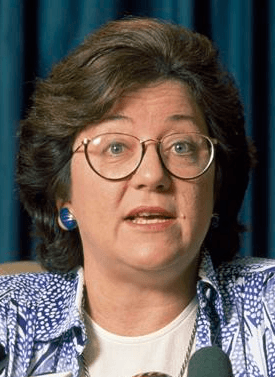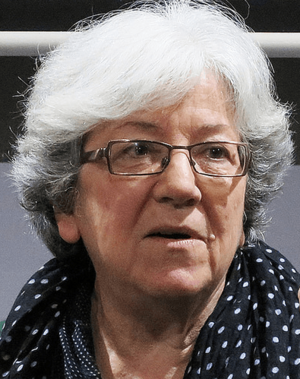Carmen Lawrence facts for kids
Quick facts for kids
Carmen Lawrence
|
|
|---|---|

Lawrence in 1990
|
|
| 25th Premier of Western Australia | |
| In office 12 February 1990 – 16 February 1993 |
|
| Monarch | Elizabeth II |
| Governor | Francis Burt |
| Deputy | Ian Taylor |
| Preceded by | Peter Dowding |
| Succeeded by | Richard Court |
| Minister for Health and Human Services | |
| In office 25 March 1994 – 11 March 1996 |
|
| Prime Minister | Paul Keating |
| Preceded by | Graham Richardson |
| Succeeded by | Michael Wooldridge |
| Minister for Women | |
| In office 25 March 1994 – 11 March 1996 |
|
| Prime Minister | Paul Keating |
| Preceded by | Ros Kelly |
| Succeeded by | Jocelyn Newman |
| Member of the Australian Parliament for Fremantle |
|
| In office 12 March 1994 – 17 October 2007 |
|
| Preceded by | John Dawkins |
| Succeeded by | Melissa Parke |
| Member of the Western Australian Legislative Assembly for Glendalough | |
| In office 4 February 1989 – 4 February 1994 |
|
| Preceded by | Constituency Created |
| Succeeded by | Michelle Roberts |
| Member of the Western Australian Legislative Assembly for Subiaco | |
| In office 8 February 1986 – 4 February 1989 |
|
| Preceded by | Tom Dadour |
| Succeeded by | Constituency Abolished |
| Personal details | |
| Born |
Carmen Mary Lawrence
2 March 1948 Northam, Western Australia, Australia |
| Political party | Labor |
| Profession | Psychologist |
Carmen Mary Lawrence AO (born 2 March 1948) is an Australian academic and former politician. She made history as the first woman to become the premier of Western Australia, serving from 1990 to 1993. She is still the only female Premier of Western Australia.
A member of the Labor Party, she later moved into federal politics. She was a member of the House of Representatives from 1994 to 2007. During this time, she served as a minister in the Keating government.
Lawrence was born in Northam, Western Australia. She studied psychology at the University of Western Australia and earned a doctorate in 1983. Before becoming a politician, she worked as a university lecturer and researcher. Lawrence was elected to the state parliament in 1986. She became a government minister in 1988. She took over from Peter Dowding as Premier in 1990. This made her Australia's second female head of government, after Rosemary Follett in the ACT. She was the first female state premier. She and the Labor Party lost power in the 1993 state election.
In 1994, Lawrence entered federal parliament through a special election called a by-election for the Division of Fremantle. She was quickly appointed to the cabinet by Prime Minister Paul Keating. She served as Minister for Human Services and Health and Minister for Women until the government lost the election in 1996. Lawrence stayed in parliament until the 2007 election. She was a senior member of the party until 2002, then a regular member. From 2004 to 2005, she was the federal president of the Labor Party. She was the first person to be directly elected to this role. After leaving politics, she returned to teaching as a psychology professor at the University of Western Australia.
Contents
Early Life and Education
Carmen Lawrence was born in Northam. This town is in the farming area of Western Australia. She spent her early childhood in the towns of Gutha and Dongara.
She was one of seven children, with six sisters and one brother. Her father, Ernest Richard Lawrence, was a farmer. Her mother was Mary Norma Lawrence.
From the age of six, she attended several Roman Catholic boarding schools. These included Marian Convent at Morawa and Dominican Ladies College at Dongara. She also went to Santa Maria College in Attadale. She finished school in 1964 with high marks in six subjects. She also won awards for her academic achievements.
University Studies and Early Career
In 1965, Lawrence began studying at the University of Western Australia in Perth. In 1968, she earned a Bachelor of Psychology degree with top honors. She won five prizes, including one for the most outstanding graduate. In 1968, she was a senior student at Saint Catherine's residential college.
She was involved in politics from a young age. While at university, she successfully campaigned to stop the Campus Beauty Contest. In Melbourne in the early 1970s, she helped start the Victorian Branch of the Women's Electoral Lobby. This group worked to help women get elected.
She taught at the University of Melbourne in 1971 and 1972. She also taught at the Western Australian Institute of Technology (WAIT) from 1973 to 1978. From 1979 to 1983, she was a lecturer in the Faculty of Medicine at the University of Western Australia. During this time, she continued her studies and earned her doctorate in psychology in 1983. Her research was about how mothers respond to babies crying.
From 1983 until she was elected to parliament in 1986, Lawrence worked for the Department of Health of Western Australia. She was in the Research and Evaluation Unit of the Psychiatric Services Branch.
State Political Career
Becoming a Member of Parliament
During this time, Carmen Lawrence joined the Labor Party. She first tried to win a seat in parliament in 1983 but was not successful. However, in 1986, she won the seat of Subiaco. This happened after the previous member, Tom Dadour, retired. In 1988, she became the Minister for Education. This happened after Brian Burke stepped down as Premier. In the 1989 election, her seat of Subiaco was removed due to boundary changes. She then won the new seat of Glendalough.
The Western Australian Labor government faced challenges due to concerns about past governments.
Premier of Western Australia
In February 1990, the Premier, Peter Dowding, resigned. Carmen Lawrence took his place as Premier on 12 February 1990. Ian Taylor became her deputy.
Lawrence was the first female Premier of an Australian State. Before her, Rosemary Follett became the Chief Minister of the ACT in May 1989.
In November 1990, Lawrence called for a special investigation into past government dealings. This was done after a lot of public and media pressure. The investigation began in March 1991. Within months, the Labor party lost its majority in parliament. This happened when three members left the party to become independent. News about the investigation was often in the headlines until the 1993 election.
Important Projects and Challenges
Between 1990 and 1992, there were several serious incidents involving stolen cars. These events led to public concern about juvenile crime. In response, Lawrence and her deputy, Ian Taylor, introduced a new law in February 1992. This law aimed to deal with serious and repeat young offenders. The law was passed quickly, but it later turned out to have problems. Lawrence later said it was a mistake, and the law was removed in June 1994.
Another important project for the government was building the Northern Suburbs Transit System. This train line is now known as the Joondalup line. Construction continued throughout Lawrence's time as Premier. She officially opened the line in December 1992. The Perth City Busport (now called Elizabeth Quay Bus Station) also opened in November 1991. This helped to centralize bus services in the city.
Election Defeat
In the election held on 6 February 1993, Carmen Lawrence's government was defeated. The Liberal and National parties formed a new government. Richard Court became the new Premier. Lawrence remained the Opposition Leader until early 1994.
Federal Political Career
Joining Federal Parliament and Cabinet
On 12 March 1994, Carmen Lawrence won a special election for the seat of Fremantle. This allowed her to enter federal politics. Fremantle is a safe Labor seat. It was once held by former Labor Prime Minister John Curtin.
On 25 March 1994, she was appointed Minister for Human Services and Health. She also became Minister assisting the Prime Minister for the Status of Women in the Keating government.
In May 1995, the Premier of Western Australia, Richard Court, asked for a special investigation. This investigation looked into how a certain petition was presented in parliament. In November 1995, the investigation found that Lawrence had not been fully truthful with the Western Australian Parliament. Prime Minister Paul Keating said the investigation was unfair and politically motivated.
In the 1996 federal election, the Keating government lost power. Kim Beazley became the new Leader of the Opposition.
Lawrence was appointed to the Opposition's senior team as Shadow Environment Minister. In February 1997, she faced charges related to the findings of the investigation. She stepped down from her role while awaiting trial. She was found not guilty in July 1999.
Later Political Life
In September 2000, Kim Beazley approved her return to the Labor team. She became the shadow minister for Aboriginal and Torres Strait Islander Affairs, the Arts, and the Status of Women. In 2001, she was recognized on the Victorian Honour Roll of Women.
During the 2001 federal election campaign, Lawrence disagreed with the government's policy on holding asylum-seekers. In December 2002, she resigned from the Shadow Cabinet. She described the party's policies on asylum and immigration as "harsh and unkind."
On 29 March 2007, she announced that she would not run for her seat in parliament again. This meant she would leave politics after the 2007 Australian federal election.
Leading the Labor Party
In 2002, the Labor Party made some changes. One change was that the party's National President would be chosen directly by party members. Carmen Lawrence became the candidate for this role from the party's Left group. The election took place in November 2003. She won the most votes and became president on 1 January 2004. She used this position to advocate for better treatment of asylum-seekers in Australia. Her term as National President ended on 1 January 2005.
After Parliament
As she had announced, Carmen Lawrence did not run in the 2007 Australian federal election. She retired from Parliament on 24 November 2007. Melissa Parke, also from the Labor Party, took over her seat in Fremantle.
After leaving federal Parliament, Lawrence worked as a professor at the University of Western Australia in 2008. She conducted research on the causes of extreme behavior, including terrorism.
In 2016, Lawrence became the president of the Conservation Council of Western Australia. She has spoken out against companies involved in fossil fuel extraction sponsoring major sports clubs.
In 2022, Lawrence was honored with the Officer of the Order of Australia award. This was for her important contributions to the people and parliaments of Australia and Western Australia. It also recognized her work in conservation and arts administration.
Notable Public Appearances
- Lawrence gave the John Curtin Memorial Lecture in 1994. She spoke about Women and Labor – A Future Perspective.
- In 1995/96, Lawrence was named the "Number One Ticket-Holder" for the Fremantle Football Club.
- From 2005, she gave lectures on the topic of Fear and Public Policy. These lectures were later published as a book called Fear and Politics.
- In 2015, Lawrence received the Australian Humanist of the Year award. This was for her consistent approach to many issues, including the welfare of Indigenous people, equality for women, and Australia's treatment of asylum seekers.
See also
- Lawrence Ministry
- List of female heads of government in Australia
 | Frances Mary Albrier |
 | Whitney Young |
 | Muhammad Ali |


